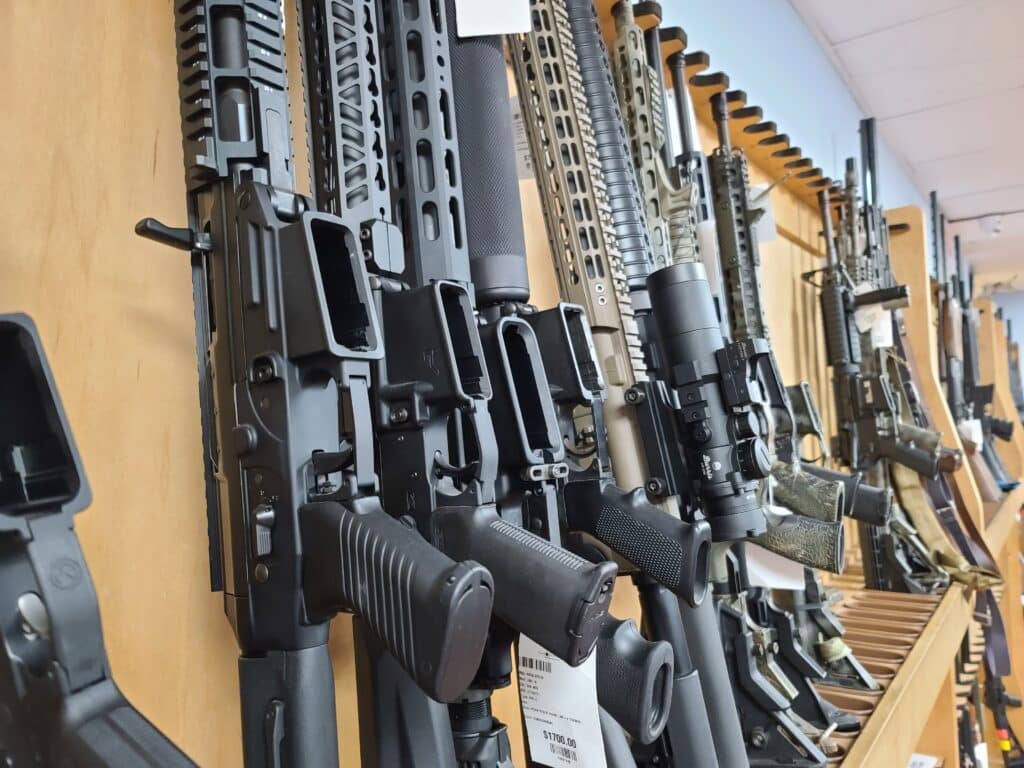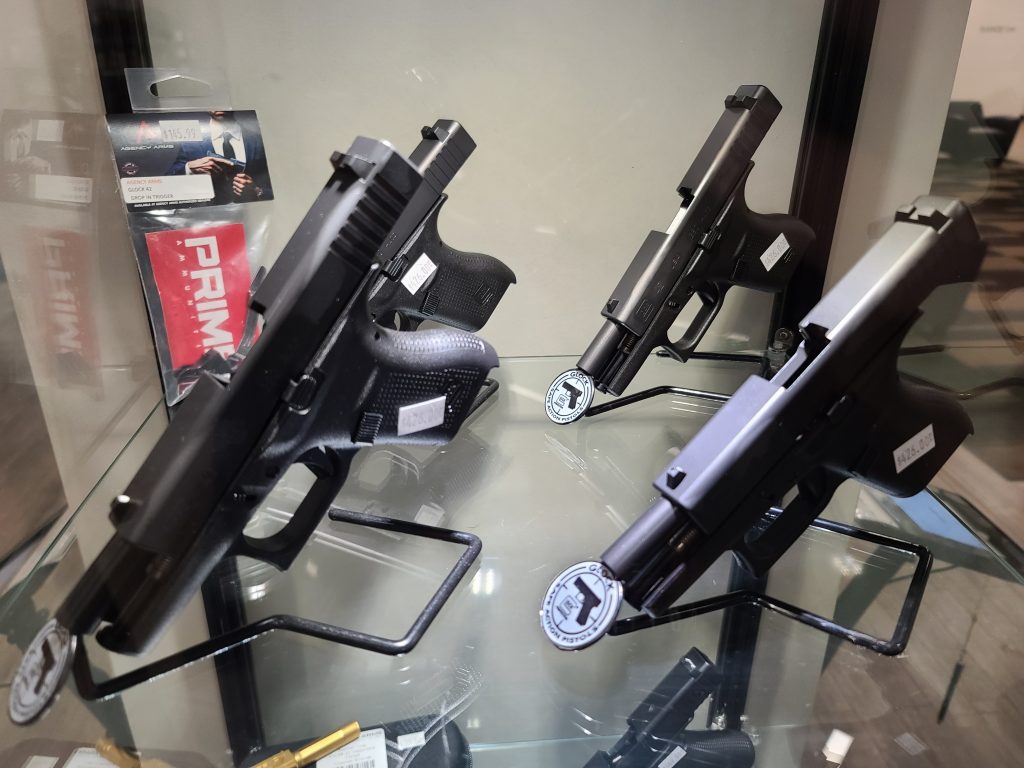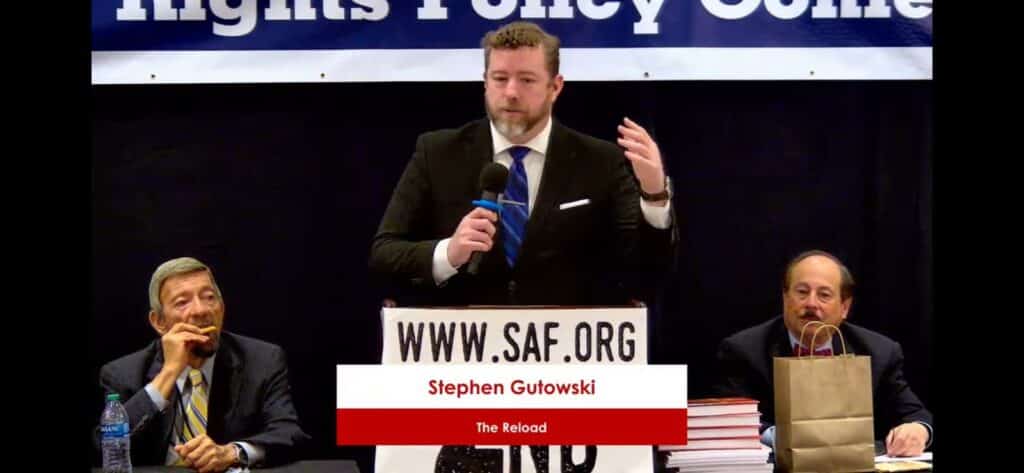We looking at more fallout from the Supreme Court’s Bruen decision this week.
The ripples from that ruling have only just begun to spread. But they are already upending core federal gun laws and long-standing political dynamics. We’re seeing stories develop that would have been unthinkable just a few short years ago.
First up, Contributing Writer Jake Fogleman takes a look at the implications of a surprising move by Texas Republicans to appeal a federal court win for gun-rights activists.
After that, I examine how a federal judge justified upholding the ban on convicted felons owning guns after striking down the prohibition on those under felony indictment from receiving firearms.
Jake also gives us an update on the Mexican government’s attempt to sue American gun makers for billions in federal court. Despite the renewed momentum for this flavor of liability suit in the wake of the Remington/Sandy Hook settlement, a federal judge tossed the case as invalid under the Protection of Lawful Commerce in Arms Act.
Plus, we take your questions on this episode of the podcast!

Analysis: Bruen Puts Texas Republicans on the Defensive [Member Exclusive]
By Jake Fogleman
In a new twist, some Republican officials have started to push back against the Supreme Court’s landscape-shifting decision in New York State Rifle and Pistol Association v. Bruen.
In August, a federal district court found that the state of Texas could not restrict law-abiding adults under 21 from carrying a firearm for self-defense under the text-and-tradition standard set in Bruen.
“Based on the Second Amendment’s text, as informed by Founding-Era history and tradition, the Court concludes that the Second Amendment protects against this prohibition,” Judge Mark Pittman wrote in his August order. “Texas’s statutory scheme must therefore be enjoined to the extent that law-abiding 18-to-20-year-olds are prohibited from applying for a license to carry a handgun.”
The decision opens up the potential for young adults to participate in Texas’s recently adopted permitless gun carry regime. But Judge Pittman stayed his decision for 30 days to allow the state to consider whether to seek an appeal. And now Texas Attorney General Ken Paxton (R.) has appealed the case to the United States Court of Appeals for the Fifth Circuit.
That means a Republican administration is in the uncommon position of fighting to have a ruling that liberalized gun-carry laws overturned. And it isn’t just in the case of carry rights for adults under the age of 21.
The decision to fight back against a major Second Amendment ruling by an ostensibly pro-gun administration marks one of the first significant instances of Republicans playing defense against the Bruen standard. Up until this point it has largely been Democratic administrations in deep-blue pockets of the country that have been scrambling to react to the decision through court battles and new legislation.
A push back from Republican politicians against Bruen‘s legal implications could run the risk of alienating pro-gun constituencies and even certain gun-rights advocacy groups that are typically considered political allies of red-state officials.
For now, groups like the Firearms Policy Coalition (FPC)–which sued the state of Texas over its ban on gun carry for young adults back in November of last year–have issued measured responses to the state’s appeal.
“Texas Public Safety Director McCraw is welcome to appeal to a higher power, as is his right,” Bill Sack, FPC Director of Legal Operations, said in a press release. “But we fully expect that he will be equally disappointed when the Fifth Circuit properly applies the Bruen standard, just as the District Court has done, and strikes down Texas’ ban.”
However, others have been more forceful in their denunciation of Texas’s willingness to put up a legal fight.
“Judge Pittman rightly ruled that all adults should be allowed to carry their handgun openly or concealed, but once again, government officials in the state of Texas are proven to be anti-gun stooges,” Dudley Brown, President of the National Association for Gun Rights, said. “Steven McCraw and DPS leadership don’t want young single mothers or military aged adults to have their rights restored – it’s pathetic, and quite frankly, a violation of their oath of office.”
State-based groups have also called out Governor Greg Abbott (R.), who is up for reelection this November, over the decision of his Department of Public Safety (DPS).
“Gov. Greg Abbott needs to lead this state and get the Texas DPS in line,” Chris McNutt, Executive Director of the group Texas Gun Rights, said in a statement. “We fought hard and successfully passed Constitutional Carry in Texas, and the ruling by Judge Pittman rightly uses the Bruen decision from this summer to restore gun rights to a large segment of adults who’ve been wrongly stripped of their constitutional rights.”
Pressure has been building on Governor Abbott from some in the state to crack down on gun access to adults under the age of 21 following the mass shooting in Uvalde, where an 18-year old used a legally purchased rifle to commit his crime. A recent Dallas Morning News survey of likely voters found 73 percent support for raising the age to buy “semi-automatic assault-style rifles”, for instance. Abbott previously poured cold water on the idea by suggesting bans targeting that age bracket would violate the Second Amendment.
“There have been three court rulings since May that have made it clear that it is unconstitutional to ban someone between the ages of 18 and 20 from being able to buy an AR–that came out of the court of appeals and then there was a Supreme Court decision that upheld it,” he said at a campaign event late last month. “And most recently, a federal court in the State of Texas struck down a Texas law that banned people between the ages of 18 and 20 from buying a handgun. So, it’s clear that the gun control law that they are seeking in Uvalde, as much as they may want it, has already been ruled as unconstitutional.”
It is unclear what changed between those statements and the Department of Public Safety he oversees challenging something he labeled “unconstitutional.” It could be that the burgeoning conflict between public opinion and recent jurisprudence on gun rights for young adults and the prospect of a looming general election played a role. Both Abbott and Paxton currently lead their Democratic challengers, though the AG race appears to be much tighter.
Perhaps it’s a ploy to court undecided voters in order to help shore up their leads over their respective challengers–particularly as candidates like Beto O’Rourke (D.) attempt to make Republican support for gun rights a salient election issue. At the same time, such a strategy could also risk alienating gun voters that are usually key to the success of a Republican campaign.
Whether the decision to appeal a significant gun-rights ruling turns out to be a political winner for Paxton or Abbott will likely determine whether other Republicans risk taking a journey down the same path.
Podcast: We Answer Your Gun Questions [Member Early Access]
By Stephen Gutowski
A lot has happened since the last time we took questions on the podcast.
We’re living through a time of great change with guns in America. Sales moved to historic levels in recent years, and millions of people from demographics that have been traditionally less likely to own guns have decided to arm themselves. Mass shootings have shocked the nation and led to the first new federal gun restrictions in generations. At the same time, the Supreme Court has handed down a seminal ruling protecting the individual right to carry firearms in public while articulating a specific new test for deciding gun cases moving forward.
Add the upcoming midterm elections on top of all of that, and you can imagine Reload Members had a lot of questions.
Contributing Writer Jake Fogleman and I did our best to provide some keen insight into the biggest gun stories of the day. We talked about the status of challenges to ‘assault weapon’ bans in the wake of Bruen, the latest with the ATF’s rulemaking, how to properly assess public polling, the status of the NRA, and the fight over gun financing.
We get into all of that and more.
You can listen to the show on your favorite podcasting app or by clicking here. You can also watch the show on our YouTube channel. Members get early access to the show on Sunday (as well as the opportunity to ask questions or appear on the show), and it goes public for everyone else on Monday.
Come on the Podcast
One of the many perks of a Reload membership is the opportunity to appear on the podcast. We’ve had a lot of people on the show from all kinds of backgrounds. It’s one of my favorite segments since it gives us all a better insight into the folks who make this publication possible. If you want to come on the show, just reply to this email and let me know!

Federal Court Tosses Mexico’s Suit Against U.S. Gun Makers
By Jake Fogleman
U.S. gun manufacturers and wholesalers cannot be held liable for criminal gun trafficking into Mexico.
That’s according to a Massachusetts federal court judge who dismissed the Mexican government’s suit against Smith & Wesson, Sturm Ruger & Co, Glock, Inc., and others late Friday. In his dismissal order, U.S. District Judge F. Dennis Saylor said the federal Protection of Lawful Commerce in Arms Act (PLCAA) shielded the companies from liability for the harms alleged by Mexico.
“Unfortunately for the government of Mexico, all of its claims are either barred by federal law or fail for other reasons,” Saylor wrote in his opinion. “The PLCAA unequivocally bars lawsuits seeking to hold gun manufacturers responsible for the acts of individuals using guns for their intended purpose. And while the statute contains several narrow exceptions, none are applicable here.”
The dismissal deals a major blow to the ongoing efforts by gun-control advocates to undermine the PLCAA. The statute has long been a target for the groups, who claim it unfairly shields U.S. gun makers from liability for the harm caused by gun violence. Gun-control activists in the U.S. hoped the Mexico suit would serve as a potent vehicle for piercing the statute’s protections. Jonathan Lowy, vice president of the litigation arm of the Brady Campaign, even joined as co-counsel for Mexico’s efforts.
Brady did not respond to a request for comment.
The National Shooting Sports Foundation (NSSF), the firearms industry trade group, celebrated the dismissal.
“We are pleased the court dismissed Mexico’s misguided and baseless lawsuit against members of the firearms industry that sought to blame them for Mexico’s unwillingness and inability to bring Mexican drug cartels to justice in Mexican courtrooms,” Larry Keane, NSSF Senior Vice President and General Counsel, told The Reload. “The crime that is devastating the people of Mexico is not the fault of members of the firearm industry, that under U.S. law, can only sell their lawful products to Americans exercising their Second Amendment rights after passing a background check.”
A bipartisan coalition in Congress passed the PLCAA in 2005 as a response to cities suing gun companies over criminal acts committed with their products, even when there was no evidence the companies were involved in those crimes. Critics compared the tactic to suing car companies over the actions of drunk drivers.
The statute stipulates those businesses engaged in the lawful making and selling of firearms and ammunition “are not and should not be liable for the harm caused by those who criminally or unlawfully misuse firearm products or ammunition products that function as designed and intended.”
Mexico filed its lawsuit against gunmakers Smith & Wesson, Sturm Ruger & Co, Glock, Barrett, Beretta, Colt, Century Arms, and Boston-based wholesaler Interstate Arms in August of last year. It accused the companies of undermining its strict gun laws by manufacturing, marketing, and selling “military-style assault weapons” in ways they knew would appeal to criminal organizations like drug cartels.
The complaint alleged up to 90 percent of guns recovered at crime scenes in Mexico were trafficked from the United States, with the suit’s defendants producing more than 68 percent of those guns. The suit accused the gunmakers of failing to implement safety practices to prevent illegal gun trafficking.
The Mexican government sought to force US gun makers to compensate Mexico $10 billion for the costs of its gun violence problem.

Analysis: Federal Judge Charts Path to Upholding Felon Gun Bans [Member Exclusive]
By Stephen Gutowski
We now have a new framework for how the federal prohibition on felons owning guns could be constitutional.
District Judge David Counts of Western Texas upheld the conviction ban this week. That’s despite the fact that he struck down the federal ban on people indicted for felonies receiving firearms just a few days beforehand. And he did it under the Supreme Court’s Bruen standard, making him among the first to apply it to federal law.
His logic will sound familiar to anyone who followed his opinion in the indictment case. After calling into question the constitutionality of the indictment ban under Bruen’s text-and-tradition standard, he did the same for the conviction ban.
“Whether this Nation has a history of disarming felons is arguably unclear—it certainly isn’t clearly ‘longstanding,’” Counts said in that ruling, dismissing a claim made in the Supreme Court’s landmark Heller decision.
However, he also outlined how he believed the conviction ban could be constitutional under the Bruen test even without a historical gun law as an analogue. Instead of relying on gun laws, Counts argued, it is better to look at how groups have been excluded from the political rights afforded to “the people.” Those historical examples provide a better guide, he said.
And now, just a few days after laying out his hypothetical test for the convicted felon prohibition, he has applied it in practice. He relied on the fact that governments in the early days of the republic prohibited people from voting if they had been convicted of certain crimes and those inciting people to violence could be prohibited from assembling in public.
“Indeed, there was a ‘longstanding’ historical tradition from the time of ratification that those convicted of a crime could be excluded from the right to vote,” Counts wrote. “For example, one year after the Second Amendment’s ratification, Kentucky’s Constitution stated, ‘[l]aws shall be made to exclude from… suffrage those who thereafter be convicted of bribery, perjury, forgery, or other high crimes and misdemeanors.’ Vermont’s Constitution followed one year later, authorizing the removal of voting rights from those engaged in bribery or corruption during elections. As of 2022, only two states and the District of Columbia do not restrict felons’ voting rights.”
This framework is similar in some respects to one used by Justice Amy Coney Barrett in Kanter v. Barr. Barrett argued in her dissent that those convicted of felonies could be prohibited from owning guns (though only if they committed violent felonies) because there was a tradition of barring dangerous groups from gun ownership as evidenced by early republic bans on Native Americans and Catholics owning guns. New York has sought to use the same argument to defend its gun laws in court.
Of course, the main problem with the Barrett approach is it relies exclusively on bigoted gun bans and attempts to generalize and sterilize them as applying to those early Americans considered “dangerous.” But it is highly questionable why the bans presented as evidence for this theory only fell along racial and religious lines. It seems dangerousness was playing a secondary role in those particular bans.
The Counts approach is not as susceptible to that pitfall. Clearly blacks, other minorities, and women were also excluded from protections afforded to “the people” in the founding era. Certainly, they were denied the right to vote in nearly all circumstances, and blacks in particular were denied all of their rights.
In fact, people in the founding era were as likely to be excluded from protections afforded to “the people” as they were to be included in them. So, relying on that approach for justifying modern gun bans has the potential to result in a fairly broad reading of what’s permissible under the Second Amendment.
Still, the Counts approach does at least provide some examples of longstanding rights restrictions that are based on a person’s criminal actions rather than their race or creed. So, it has a bit more to stand on.
Although, there are other weaknesses too. The number of crimes covered under modern felony laws dwarfs the number in the founding era. While the analogue of felons being prohibited from voting seems to fit fairly well with felons being barred from owning guns, the ban on inciting speech isn’t really the same since it isn’t a permanent ban on protesting for the offender.
It’s likely federal courts will refine the Counts approach if they do adopt it as a framework moving forward. His framework isn’t without its problems, and it’s among the first attempt at reconciling federal gun prohibitions with the Bruen standard. But it has the potential to become very influential among Counts’ piers moving forward.
My Keynote Speech at GRPC
On Saturday, I spoke at the Gun Rights Policy Conference. It was nice to be back in person after two years of virtual events. I was glad to see a number of Reload subscribers there and happy to meet several of you for the first time!
My speech focused on The Reload and what we’ve been able to accomplish in a short time with limited resources. I think this publication is a proof of concept for how the bar for entry into the realm of influential reporting is much lower today than at any point in the past. This publication has had a great deal of success and we are set up to grow into something even bigger moving forward. But only because of the support of our members, which The Reload literally couldn’t exist without.
You can watch my full speech here.
That’s it for now.
I’ll talk to you all again soon.
Thanks,
Stephen Gutowski
Founder
The Reload









2 Responses
The Reload is an excellent source of 2nd Amendment news and opinion. Thank you for your efforts!
Thank you for the support! It would be literally impossible for us to do this work without support from you and the other Reload members.